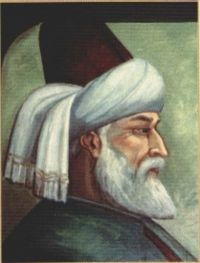The directory «Plots»
Rumi Jalal ad-Din Muhammad (Mevlânâ)
(1207—1273)

Theolegian and poet. The name Mevlânâ means “our master and president” and implies the love of people for him. The name Rûmî (pertaining to Anatolia) was given to him as he lived in Konya. His father Muhammed Bahaeddin Veled (1191 -1231), the scholar and theologian who was known as Sultanu'l Ulema (Sultan of Scholars) migrated to Anatolia via Damascus and Hejaz because of the Mogul invasion. After living in Malatya, Erzincan, Akşehir and Larende (Karaman) for a while, he settled in Konya (1229). Bahaeddin Veled was welcomed with respect by the Seljuk Sultan Alaeddin Keykubat and here he preached and guided people for two years. The young scholar Celâleddin, who took his father’s place after his death (1231), tried to help the people of Konya through guidance and to improve his knowledge, which he had acquired in Belh and Damascus. He attended the lectures on theosophy given by Seyyid Burhaneddin, the successor to his father who arrived in Konya one year after his father’s death and, it is said, by Sadreddin Konevî. He went to Damascus and Aleppo to further improve his knowledge and met Şemsi Tebrizî (Şemseddin Muhammed Tebrizî). On his return to Konya, he continued preaching at mosques and giving lectures at Madrasah Muslim Schools.
Şemsi Tebrizî’s visit to Konya (1244) was a turning point in Mevlânâ’s life. He established a close relationship with Şems, whom he loved and respected deeply. He spent all his time in discussion with Şems and cancelled all his lectures and sermons in order to learn more about theosophy. Şems suddenly disappeared when people began to envy his attachment to Mevlana and spread rumors about him (1246). However, his departure upset Mevlânâ deeply and he completely isolated himself into an inner world. He began to write his poems during this period. He heard that Şems was in Damascus and sent his son, Sultan Veled, to persuade him to come back to Konya. Şems returned to Konya upon the request of Mevlânâ. However people were again jealous of him and Şems left Konya, never to return (1247). It is said that, he was later killed by a group led by Alaeddin Çelebi, the son of Mevlânâ, and this was kept secret from Mevlânâ. Losing Şems again caused Mevlânâ great suffering. He went to Damascus twice in order to find him and came back to Konya with nothing. He appointed Selahaddin Zerkûb, a jeweler among his followers, as his successor (1254). Upon hearing that some of the people of Konya wanted to kill him, Selahaddin Zerkûb once said: “My life is in the hands of God; how can a man kill me?” When Zerkûb died (1263), Çelebi Hüsameddin became Mevlânâ’s caliph during his last years.
The principles of the Mevlevi order were determined within a system by his son, Sultan Veled. One of the proud men of reason and literature in Turkish history and one of the greatest poets and intellectuals in the world, Mevlânâ Celâleddin Rûmî is commemorated at a ceremony held in Konya in December every year. The works of Mevlânâ Celâleddin Rûmî, which include bilingual poems in Turkish and Persian, are each a classic of Eastern Islam and most of them are in Persian, as it was the literary language of the time. All of his works have been translated into Turkish by Abdülbaki Gölpınarlı. Most of his works, particularly his Mesnevi* and Divan*, have been translated into many languages around the world.
Afganistan, 2006, Balkhi
Afganistan, 2006, Jalal ad-Din Rumi
Afganistan, 2006, Jalal ad-Din Rumi
Afganistan, 2007, Jalal ad-Din Rumi
Egipte, 2007, Jalal ad-Din Rumi
Iran, 1974, Jalal ad-Din Rumi
Iran, 1997, Jalal ad-Din Rumi
Iran, 2005, Jalal ad-Din Rumi
Iran, 2007, Jalal ad-Din Rumi
Pakistan, 1997, Jalal ad-Din Rumi
Syria, 2005, Jalal ad-Din Rumi
Tajikistan, 2007, Jalal ad-Din Rumi
Tajikistan, 2007, Jalal ad-Din Rumi
Tajikistan, 2007, Jalal ad-Din Rumi
Tajikistan, 2007, Jalal ad-Din Rumi
Tajikistan, 2007, Jalal ad-Din Rumi
Tajikistan, 2007, Jalal ad-Din Rumi
Turkey, 1957, Mevlana's Tomb, Konya
Turkey, 1957, Konya Museum
Turkey, 1957, Jalal ad-Din Rumi
Turkey, 1973, Mevlana's Tomb and dancing dervishes
Turkey, 1973, Jalal ad-Din Rumi
Turkey, 2005, Jalal ad-Din Rumi
Turkey, 2006, Mevlana's Tomb in Konya
Turkey, 2007, Mevlânâ